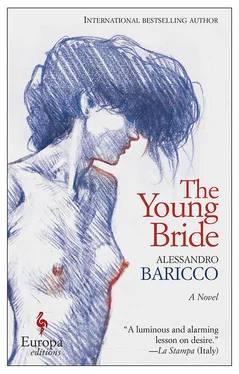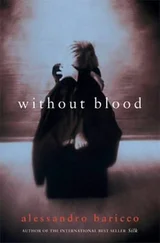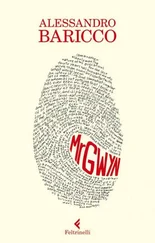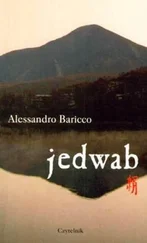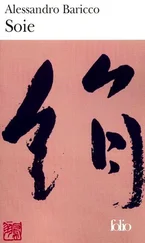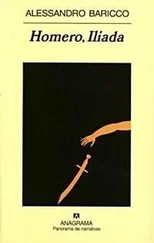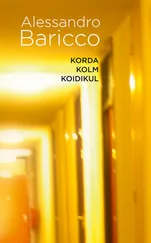He looked at me.
Do you know where to find the paper napkins? I asked.
Of course, come with me.
He walked in front of me, in his white smock, and for a second I saw the only person who in those hours inhabited with dignity the open landscape of my distress. That’s why I’m able to understand how the Father, instead of saying something about the Son, reached into a drawer and took out an envelope, which had been opened and was covered with stamps. He turned it over in his hands. Then he offered it to Modesto. He said that it came from Argentina.
Modesto did not have imagination at his disposal — a useless, if not harmful, gift in his occupation — so he didn’t move: he was talking about the Son, Argentina had nothing to do with him, or, if it did, it was through connections that he couldn’t chart.
But the Father was frightened by his own solitude, so he made a peremptory gesture and said:
Read it, Modesto.
He took it. Opening it, he found himself thinking that, in fifty-nine years of service, he had had access to a lot of secrets, and yet it was the first time that someone was ordering him expressly to do so. He was wondering if this would in some way change the laws of his position in that House, when the first lines carried him away from any thought. The letter was written in a somewhat labored handwriting, but with an orderliness that only toward the end yielded to weariness. It named things without seeking elegance or precision, but restoring everything to the simplicity that we imagine facts have, when we haven’t had the privilege of studying them. There was no luxury, or fuss, or intelligence. Stones, if they spoke, would do so like that. It was a short letter. It was signed with a seal.
Modesto refolded the sheet of paper and, with an instinctive vocation to order, put it in the envelope. The first thing he noted, disoriented, was that there was no trace of the Son in that letter: it was something completely different. He wasn’t used to confronting things in that way — he had always had the ability to arrange problems in a linear sequence, in which it was possible to consider them one at a time: setting the table constituted the most elevated example of that precept.
The second thing he noted he said aloud.
It’s terrible.
Yes, said the Father.
Modesto put the letter on the table, as if it were burning hot.
When did it arrive? he asked. He didn’t remember having ever in his life uttered so direct a question to the Father, or to the Father of the Father.
A few days ago, the Father answered. An informant of Comandini’s wrote it — I had asked him to keep the situation vaguely under control.
Modesto nodded. He didn’t love the ways of Comandini, but he had always recognized his ability.
Does the young Bride know? he asked.
No, said the Father.
She’ll have to be told.
The Father got up.
Maybe, he said.
He stood for a moment, uncertain whether to go to the window, to carve out a silent pause, or to pace the room with slow steps that would enable Modesto to understand his weariness, but also his calm. He decided to walk around the table and stop, in front of the servant. He looked at him.
He told him that many years earlier he had started to do something, and that ever since he had continued to devote himself to the illusion of finishing it. He said, rather obscurely, that he had inherited from his family a tangled knot in which the thread of life and the thread of death were no longer distinguishable, and he said he had thought of untangling it, and that was his project. He could remember the precise day when it had occurred to him, and that was the day of his father’s death — because of how he died, how he had wished to die. From that point he had begun to work patiently, convinced that starting would be the most difficult part: but now he understood that unexpected trials awaited him, of which he had no experience, and in the face of which his knowledge was proving insufficient. Yet he couldn’t turn back, except to ask questions for which he had neither the talent nor the answers. So there was still that path to follow, and suddenly he realized that he had lost the traces because someone had moved the signs that he had prepared in advance, or confused them. And a fog or a twilight, he wasn’t sure, was descending over everything. So he had never been so close to getting lost, and that was the reason that he was now, to his surprise, explaining all that to a man whom I remember, eternally, moving around my life as a child, present everywhere and always absent, so inexplicable that I was driven one day to ask my father who he was, and heard him answer, He’s a servant, our best servant. Then I asked him what a servant did. He’s a man who doesn’t exist, my father explained.
Modesto smiled.
It’s quite an exact definition, he said.
But he had moved one leg slightly toward the outside of the chair, and the Father understood that he couldn’t ask that man to retrace with him the footsteps of his own disorientation. He wasn’t born for that, and, if anything, his work fated him to be in the service of the exact opposite — to manage some certainties, given in life, crystallized by a family.
Then the Father recovered his usual mild firmness.
Tomorrow I’m going to the city, he said.
It’s not Thursday, sir.
I know.
As you wish.
I’ll take the young Bride with me. We’ll go by train. I count on you to arrange for privacy, the ideal would be to travel alone.
Certainly.
Another thing, Modesto.
Yes.
The Father smiled. Because he saw the man regain color, now that he had brought him back to the surface of his tasks, after having rashly forced him into the secrets of dubious reflections. He had even put his leg back in place, lined up with the other, prepared to stay.
In twenty-two days we’ll leave for vacation, he said with placid assurance. No change in the usual plans. Naturally the house will be left completely empty, to rest, as we have always done.
Then he gave a generic response to a question that Modesto wouldn’t have had the courage to ask.
The Son will know how to behave, he said, however things go.
Good, said Modesto.
He waited a moment and then rose. With your permission, he said. He started on the backward steps that preceded the legendary gust of wind, when the Father, with a question, caused him to interrupt his favorite number and look up.
Modesto, I’ve been wanting to ask you for years: what do you do when we leave and close up the house?
I get drunk, Modesto answered, with unpredictable readiness and heedless sincerity.
For two weeks?
Yes, sir, every day for two weeks.
Where?
I have a person who takes care of me, in the city.
May I go so far as to ask what type of person it is?
If it’s strictly necessary, sir.
The Father thought for a moment.
No, I don’t think it’s strictly necessary.
Modesto made a slight, grateful bow and had himself carried away by the usual gust of wind. The Father really seemed to feel a breeze, so great was that man’s mastery. Thus he sat for a while in the brine of his own admiration, before getting up and venturing to do what, during the conversation with Modesto, it had occurred to him to do, with some urgency, amazed that he hadn’t thought of it before. He left the study and combed the house to find what he was looking for, that is, the Uncle. He found him, obviously asleep, on the sofa in the hall, one of those sofas that no one reckons will be sat on — they have been added to the space to correct it, a need is feigned in order to fill a void. It’s the same logic that produces lies in marriage. The Father went to get a chair and brought it next to the sofa. He sat down. The Uncle as he slept held a cigarette between his fingers, unlit. His features were free of any thought, and he breathed slowly, in the pure exercise of a necessity of life, free of hidden purposes or ulterior motives. The Father spoke in a low voice and said that the Son had disappeared, and that he could perceive him, every hour, in the irrevocable act of separating, from everyone and probably from himself. He said that he was unable to interpret it as a possibly productive variation in his fate as a man, although he admitted that it could in fact be one, because he’d never believed it would be possible to put the world in order if one allowed that some elements enjoyed the privilege of disappearing, a word he abhorred. So he was helpless, and wondered if he, the Uncle, might perhaps bring back his child, as he had known how to do so long ago, in a mysterious but punctual way, or at least help him to understand the etiquette of disappearances, since he seemed to know the details, and maybe even the ultimate reasons. He twisted his hands together as he spoke, in a nervous gesture that wasn’t habitual, and that he knew came from the land toward which he was traveling, with the slow steps of his last pilgrimage.
Читать дальше
